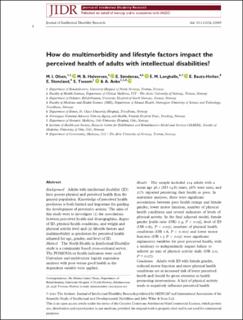| dc.description.abstract | Background: Adults with intellectual disability (ID) have poorer physical and perceived health than the general population. Knowledge of perceived health predictors is both limited and important for guiding the development of preventive actions. The aims of this study were to investigate (1) the associations between perceived health and demographics, degree of ID, physical health conditions, and weight and physical activity level and (2) lifestyle factors and multimorbidity as predictors for perceived health adjusted for age, gender, and level of ID. Method: The North Health in Intellectual Disability study is a community based cross-sectional survey. The POMONA-15 health indicators were used. Univariate and multivariate logistic regression analyses with poor versus good health as the dependent variable were applied. Results: The sample included 214 adults with a mean age 36.1 (SD 13.8) years; 56% were men, and 27% reported perceiving their health as poor. In univariate analyses, there were significant associations between poor health ratings and female gender, lower motor function, number of physical health conditions and several indicators of levels of physical activity. In the final adjusted model, female gender [odds ratio (OR) 2.4, P < 0.05], level of ID (OR 0.65, P < 0.05), numbers of physical health conditions (OR 1.6, P < 0.001) and lower motor function (OR 1.5 P < 0.05) were significant explanatory variables for poor perceived health, with a tendency to independently impact failure to achieve 30 min of physical activity daily (OR 2.0, P = 0.07). Conclusion: Adults with ID with female gender, reduced motor function and more physical health conditions are at increased risk of lower perceived health and should be given attention in health promoting interventions. A lack of physical activity tends to negatively influence perceived health. | en_US |

